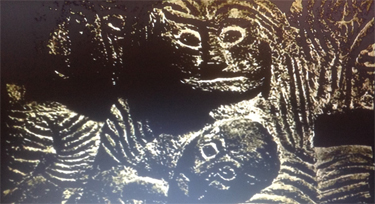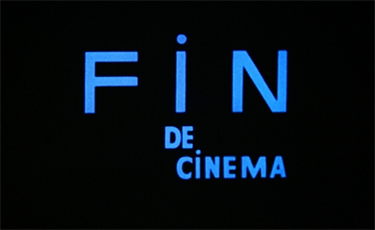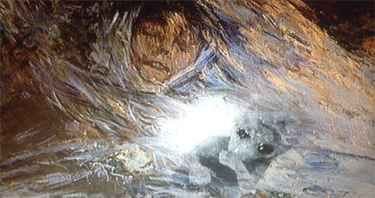Retrospective
|
Yes, freedom is being won and burdens vanish like charms from the back of the minds carrying visions of monumental constructs on their shoulders, but wouldn't it all be reduced to the chaotic arrangement of stars of the night sky and be drowned into an eternal entropy of things had we abandoned the detailed structuration of our works? Arguments could be, of course, given in favor (a) of life's not having a distinct classical storyline intrinsic to it, (b) of Godard's making sense when he noticed that "life is so different from books" in Pierrot le fou and rejected the Aristotelian division to the sacred triad composed of the opening, the climax and the resolution, and (c) of the fact that a Godard's or a Cassavetes' movie, always plotless, evolving unpredictably, reflects life more veritably than any preconceived dramaturgical wholes. Godard could be accused of being megalomaniacal at times as well. "I wanted to include everything: sports, politics, even groceries. Everything should be put in a film", he says, echoing Mahler's aspiration to compose symphonies that are"like the world – they must embrace everything". If that was an honest aim, especially in view of the limitations of cinema that Godard strived to explicate in his cinematic expression, we know not, but we could endlessly talk about. Whether that was also a goal that could be proven passé in view of (a) the pending shifts to punk and electro minimalism that many pop arts were to undergo shortly after the pretentious, prog-rock, Sgt. Pepperish trends paralleling the peak of La Nouvelle Vaguewere over,and (b) the minimalism that the European cinema had to embrace to differentiate itself from the pageantry of Hollywood, we know not either. With all these things changed, maybe everything in Godard's art that resonated solely with the 1960s generation would have been made timeless and maybe even Week-end, that parody on almost every single feature of the Hollywood blockbusters of the 1960s, would be a more relevant movie today than it is. As it stands now, understanding Godard requires perceiving him from a stance well familiarized with the history of cinema.Even more importantly, it requires focusing on the invisibles, on that implicit message hidden at the conceptual, not plainly visible level of expression. The subtlety of such an approach to communication, of course, presentsbeauty in itself.
Histoire(s) du cinema: The Control of the Universe (1998). "It follows our course toward death by the traces of blood which mark it. Cinema does not weep, it does not weep over us. It does not comfort us because it is with us, because it is ourselves. It is there when the cradle is illumined. It is there when the young girl appears to us leaning on the windowsill with eyes that do not know and a pearl between her breasts... It is there when we are dead, and our corpse offers its winding-sheet to the arms of our sons". Godard emotionally disconnects art from life so as to make the process of its dissolution in the ocean of life less painful.
Week-end (1967).The epic final screenshot drawing the curtain on cinema in Godard's eyes and on the entire La Nouvelle Vague era. The carpet bomb was detonated, everything that made cinema what it waslaydeconstructed and demolished,and the end of cinema as we had known it could be announced. Would all other social spheres be revitalized, fostered to evolve at an unprecedented rate or simply be sentenced to permanent desertion and infertility had everybody's aim been to create something similar as to what Godard strived to create under this "the end of cinema" banner, that is, to shatter the paradigm, to get rid of the old, to erase the standards and, effectively, abolish the need for the given sphere to exist under the Sun? Art for the diminishment of the art's sake Still, wonder remains if all these drawbacks were deliberate, serving the purpose of annihilating oneself for the sake of becoming One with all that there is; destroying the cinema for the sake of pulling the dreamers away from its darkened rooms and into the daylight of life, the destination of every dreamer's dream.In his most recent movie, Adieu au Langage, Godard toys with the etymological curiosity that the Russian word for camera was derived from the word for prison. This is a natural addition to the question Roland receives in Week-end, "Are you in a film or in reality", hinting at this blurring of the boundary between art and life that presents the central goal of Godard's filmmaking. To shatter the camera and symbolically erase the distinction between art and life is thus an act analogous to crushing the prison walls and allowing the prisoner, a metaphor of the moviegoer, to escape into freedom. One could perceive the proposition of this analogy as a culmination of the artist's working towards self-annihilation as the most sublime act on his spiritual quest, the act that uses art to destroy the very art in question and point at life as art itself, as more artistic than any formally presented pieces of art out there. The ultimate point of thisanarchic endeavor is, of course, for an artist to disappear and make way for life, the beauty of which all arts have been pointing anyway. |
Pierrot le fou, for example, the personification of an artist in this postmodern cinematic milestone and an archetypical postmodernist anti-film, first leaves society behind to run away with his muse, but only to eventually sacrifice her and then, in an effort to show us the beauty of life untainted by human petties and sinful spirits, commit a suicide, killing oneself, the artist and the art, ending it all with a view of the endless sea, the symbol of the utmost spiritual fulfillment that is the death of one's ego and the merging of the self with the omnipresent ocean of divine spirit encompassing everything.'Tis the blissful moment in which everything becomes the emanation of the most wonderful art conceivable and in which we could repeat after Juliette from 2 ou 3 choses que je saisd'elle:"I am the world".'Tis also the painful moment in which art, as a concept, along with the artist, a conscious creator of something more sublime than the all-pervading beauties of the commonest of things surrounding us, cease to exist. If we disobey this call and delay the death of our ego and of the formal artist in us, the chance is that we might find ourselves in the shoes of the painter from Vivre sa vie, he who zealously portrayed muses and, as the last tint on his painting was drawn, stood up, marveled over his accomplishment and concluded that "this is Life itself". However,when he turned his eyes away from the canvas to look at the living muses walking around him,muses whom he had painted so devotedly, he realized that they have long disappeared into the dark of the night. If the key attempt of Godard's filmmaking was to be an "anarchist savior" , the epithet Ivan Illich attributed to the Christ, and save the world using cinema as a tool that obliterates that very same tool and shows us the beauty of life, the only faithful way to end this essay is to use the words piled up here as a tool to destroy that very same tool and, like Wittgenstein at the end of TractatusLogico-Philosophicus, leave us speechless and in awe under the starry sky of life and its infinite beauties, lying beyond what any camera or pen could capture. The purpose of this whole array of words is, therefore, to make the reader look away from them, being the same goal Godard strived to attain throughout the most of his filmmaking career. For, "reality is too complex for oral communication", as it is said in the opening scene of Alphaville, and all that language is, as Juliette from 2 ou 3 choses que je sais d'elle reminds us, is "the house man lives in", suggesting the safety and comfort that abiding in it brings, but equally insinuating that the most exciting things, life as it were, happen strictly outside of it.
Histoire(s) du cinema: The Coin of the Absolute (1998). "...here is the question, it's bigger than India, England or Russia, it's the small child inside the mother's womb". Indeed, in this space outside of the verbal and the cinematic frames is where the world begins. And ends too.So I leave you here. Beyond words, at the entrance to life lived to its fullest. It is in a moment like this that Apu tosses his treasured notes in the wind and Kurosawa's Kikori, the woodcutter leaves behind the inextricably looped, labyrinthine lines drawn by the mental pen, and lift altogether a child into the air. At the same moment, on the opposite, darker side of the globe, as Godard's heroine becomes liberated from the city of Alphavilleand is on her way to the Outlands, where she could afford being an outsider and a beautiful spirit once again, she forgets language and comes up with all the words she would need on this new, celestial plane of reality whereon life is lived, not only vainly discussed about: "I... You... Love... I Love you". It is then that we realize that no Word could save the world. Only life can save life. It is then that silhouettes begin to dance on the walls, with shadows of eucalyptus trees and swaying snowdrop wildflowers. It is then that we wave a soft goodbye to language, that good old corruptor of feeling and the source of hypocrisies that have plagued humanity and sickened human spirits ever since its dawn. It is then that firmaments begin to shake with love and wonder of a child, untainted and infinitely pure, born to this world. Hence the sound of a baby crying in the dying moments of Godard's most recent movie, his characteristically convoluted farewell to language. Or, as put forth by Godard himself in Histoire(s) du cinema(Chapter 3a: The Coin of the Absolute): "Squabbling about public indignation, nothing more pathetic. Toning down makes things worse. Subtlety pleads for barbarism. Let's call things by their name. Killing a man in the Bondy Forest or Black Forest is a crime. Killing a country in the other forest called diplomacy is a crime as well, but just bigger. Where will it stop? When will the martyr of this heroic small nation end? So they tell us, 'You forget there are some questions'. Killing a man is a crime. Killing a country is a question. Each government has its question. We answer, 'Humanity also has a question'. And here is the question, it's bigger than India, England or Russia, it's the small child inside the mother's womb". The reduction of the consciousness to that of a preverbal child, Taoist in nature, aware that "arguing is unwise" (Tao-Te-Xing 81), feeling all the way through "as if I were the world and the world were me",presents the last and the final step of our walking in Godard's anarchic footsteps through this enticing cinematic forest, in search of a flower here, a balloon there and love everywhere. Vuk USKOKOVIĆ The author is a professor of bioengineering at the University of Illinois in Chicago and a professor of biomedical and pharmaceutical sciences at Chapman University in Irvine, California. Though a cinéphilepar excellence, like Jean-Luc Godard himself, he does not have a single day of official training in film theory. Nonetheless, he is a huge aficionado of the art of cinema and frequently writes about it. |




